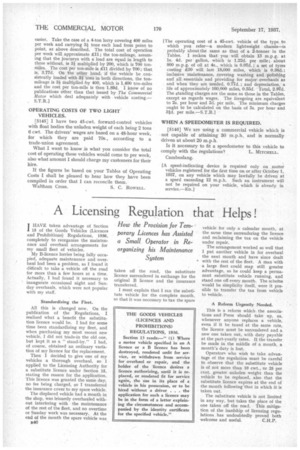A Licensing Regulation that Helps !
Page 50

If you've noticed an error in this article please click here to report it so we can fix it.
How the Provision for Temporary Licences has Assisted a Small Operator in Reorganizing his Maintenance System
1 HAVE taken advantage of Section 15 of the Goods Vehicles (Licences and Prohibitions) Regulations, 1936, completely to reorganize the maintenance and overhaul arrangements for my small fleet of vehicles.
My B-licence lorries being fully occupied, adequate maintenance and overhaul had been a problem, as I found it difficult to take a vehicle off the road for more than a few hours at a time. Actually, I had found it necessary to inaugurate occasional night and Sunday overhauls, which were not popular with my staff.
Standardizing the Fleet.
All this is changed now. On the publication of the Regulations, I realized what a benefit the substitution licence would be. I had for some time been standardizing my fleet, and when purchasing my most recent new vehicle, I did not trade-in the old one, but kept it as a " stand-by." I had, of course, obtained an ordinary variation of my licence for the replacement.
Then I decided to give one of my vehicles a thorough overhaul, so I applied to the Licensing Authority for a substitute licence under Section 15, stating the reason for the application. This licence was granted the same day, no fee being charged, so I transferred the insurance cover to my spare vehicle.
The displaced vehicle had a month in the shop, was leisurely overhauled without interfering with the maintenance of the rest of the fleet, and no overtime or Sunday work was necessary, At the end of the month the spare vehicle was
B40 taken off the road, the substitute licence surrendered in exchange for the original B licence and the insurance transferred.
I must explain that I ran the substitute vehicle for the complete month, so that it was necessary to tax the spare vehicle for only a calendar month, at the same time surrendering the licence and reclaiming the tax on the vehicle under repair.
The arrangement worked so well that I put another vehicle in for overhaul the next month and have since dealt with the rest of the fleet. A man with a large fleet could reap still greater advantage, as he could keep a permanent substitute vehicle running, and stand one off every month. The scheine would be simplicity itself, were it possible to transfer the tax from vehicle to vehicle.
A Reform Urgently Needed.
This is a reform which the associations and Press should take up, as, whenever anyone replaces a vehicle, even if it be taxed at the same rate, the licence must be surrendered and a new one taken out, with duty payable at the part-yearly rates. If the transfer be made in the middle of a month, a month's duty is lost.
Operator; who wish to take advantage of the regulation must be careful to observe that the substitute vehicle is of not more than 10 cwt., -or 25 per cent, greater unladen weight than the vehicle to be replaced, also that the substitute licence expires at the end of the month following that in which it is taken out.
The substitute vehicle is not limited in any way, but takes the place of the one taken off the road. This mitigation of the hardship of licensing regulations has undoubtedly proved both
welcome and useful. C.H.P.




















































































